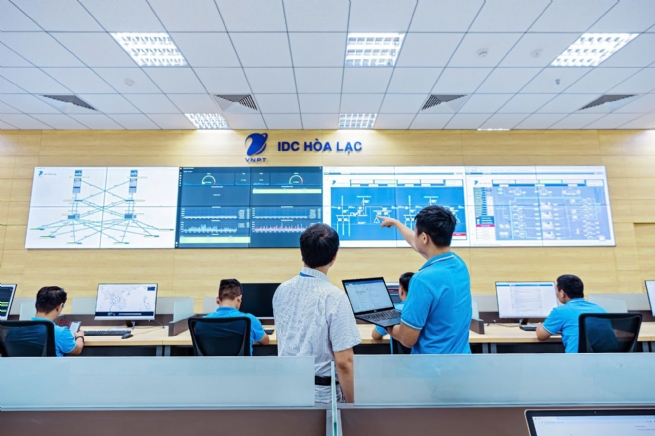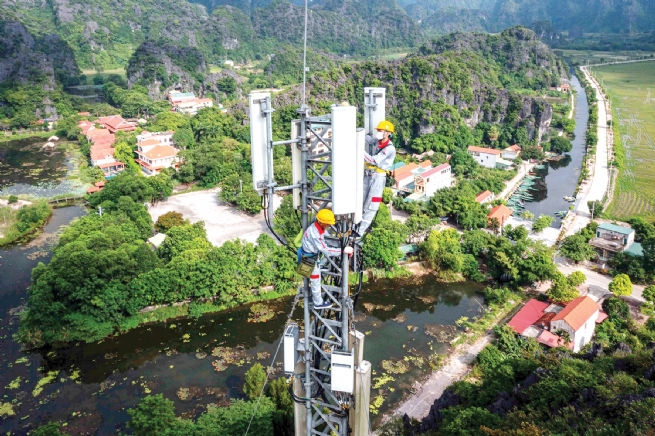Toward Universal, Green, and Secure Digital Infrastructure
Postal services need to become a logistics infrastructure ensuring the flow of materials alongside the flow of data, while telecommunications must serve as a digital infrastructure supporting national digital transformation. This is a strategic requirement emphasized by Minister of Science and Technology Nguyen Manh Hung at the conference reviewing the first six months of the year and deploying tasks for the last six months of 2025 of the Ministry of Science and Technology.

VNPT IDC Hoa Lac - the largest and most modern data center in Vietnam
Nationwide 5G coverage is an urgent task
According to Minister Nguyen Manh Hung, the Ministry of Science and Technology holds an important mission of leading Vietnam into a new development stage based on science and technology, innovation and digital transformation, gradually moving toward the goal of becoming a high-income country. To realize this goal, Minister Nguyen Manh Hung emphasized the need for strategic shifts in each field. In particular, postal services must become logistics infrastructure, ensuring the flow of material alongside the flow of data, and delivering goods to businesses and consumers quickly, accurately and safely.
Telecommunications must become digital infrastructure to serve digital transformation. Digital infrastructure will be strategic infrastructure, like transportation and electricity. This infrastructure must be universal, with ultra-wide bandwidth, massive capacity, and be green and secure. It will become the foundation of the entire economy. "Nationwide 5G coverage is an urgent task from now until the end of the year," Minister Nguyen Manh Hung emphasized. In parallel, the minimum mobile internet speed must exceed 100 Mbps (double the current rate), and the minimum fixed fiber optic internet speed must reach 200 Mbps.

Telecom operators are rapidly expanding 5G coverage
Digital transformation and innovation must create economic growth
According to Minister Nguyen Manh Hung, digital transformation with components such as digital government, digital economy and digital society aims to build a "digital version" of the real world for Vietnam to become a digital nation. It involves comprehensive digitalization, then applying digital technology, especially AI, to process digital data. "At present, digital transformation remains in the form of information technology, meaning it still focuses on purchasing and developing software without changing the operating process," Minister Nguyen Manh Hung acknowledged.
He emphasized that adopting a new operating model is the most important step to enhance the effectiveness of digital transformation.
In terms of resources, he noted that while the state budget for digital transformation accounts for only 1%, it must be activated to mobilize 3-4 times more investment from society. Digital transformation must also contribute 1%-1.5% to GDP growth.
Minister Nguyen Manh Hung also emphasized that science, technology and innovation must focus on enhancing national competitiveness, driving economic growth and improving people’s quality of life. Science and technology must contribute 1% to economic growth. For every Vietnam Dong the State spends on research, the resulting outcomes must generate 10 Dong in revenue for businesses. Likewise, every Dong invested by the State in research and development must attract 3-4 Dong from businesses for research and development activities.
“Scientists today must not stop at academic titles, degrees, articles or awards; more importantly, their research results must make a real impact on the country’s socio-economic situation,” Hung said.

Telecommunications must become digital infrastructure to serve digital transformation
Innovation is identified as the path to applying science and technology to life. Applying technology, innovating technology, transferring technology, improving technology efficiency, and advancing toward technological creation are essential ways to use technology to boost labor productivity and increase total factor productivity (TFP). Innovation must contribute 3% to GDP growth, and each ministry, sector, and locality needs to establish an innovation center.
Minister Nguyen Manh Hung also emphasized the importance of intellectual property. A developed country is one where 80% of its assets are intellectual property. Therefore, he proposed building ethics and a social culture that values intellectual property, thereby fostering innovation, research, and the commercialization of scientific outcomes. In the field of nuclear energy, the upcoming focus will be on new-generation nuclear power, specifically small-scale modular nuclear reactors. Nuclear power will serve as green and base-load electricity, becoming a national strategy, and Vietnam must master nuclear technology.
Regarding standards and regulations, Minister Nguyen Manh Hung emphasized that standards serve as the direction for national development, while regulations act as the national protection fence. At present, the number of standards required for the country’s development remains insufficient, making it necessary to strongly reform standardization efforts in line with international integration.
He also noted that at the 9th session, the 15th National Assembly passed five amended laws related to science and technology: the Law on Science, Technology and Innovation; the Law on Digital Technology Industry; the Law on Technical Standards and Regulations; the Law on Product and Goods Quality; and the Law on Atomic Energy.
From now until the end of 2025, the Ministry of Science and Technology must complete and submit four additional laws, including one new law: the Law on Digital Transformation, and three amended laws: the Law on High Technology, the Law on Technology Transfer, and the Law on Intellectual Property. This means that in 2025 alone, the Ministry of Science and Technology will be responsible for drafting nine laws related to science and technology, innovation and digital transformation.
With such a large legislative workload and in the spirit of strong reform under Resolution 57, the ministry must make significant efforts, show strong determination, and especially adopt new working approaches, working tirelessly to meet deadlines. Minister Nguyen Manh Hung emphasized: “Now is the time for us to work harder, take on bigger tasks, and focus on achieving tangible outcomes in economic growth, improving people’s quality of life and enhancing national governance capacity.”








